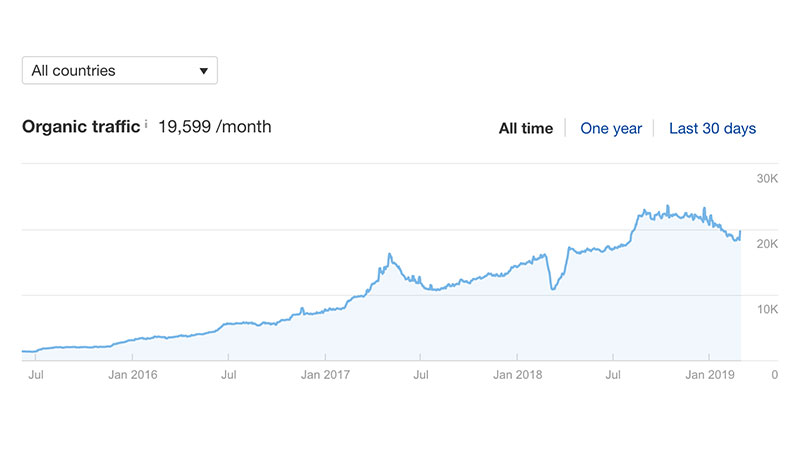Backlinks Defined – What is a Backlink?
Join the 1,000+ brands that trust us for their link building.
What is a Link?
You are obviously familiar with website links (or more technically, hyperlinks). You may have even followed a link to this web page.
Every web page has a specific address called a URL (Uniform Resource Locator), and links, such as a line of text, reference these URLs to display the web page content.
Simply put, a link uses a website’s URL to direct a visitor to that location to view content.
Links are not inconsequential to someone who cares about search engine rankings, and sometimes links have specific and important implications in relation to websites and other online assets. This is the case when dealing with backlinks — the most important tool for search engine ranking and the cornerstone of SEO link building strategies.
Link Example: This is a link to SirLinksalot.co’s homepage.
What is a Backlink?
Now let’s expand on the concept of the “backlink” and its nuances:

A backlink, or inbound link, is a hyperlink from some other web source (i.e. a referring domain or internal page) to your website (or another internal page). It is a link that sends a website visitor directly to one of your target web pages. That is a fairly simple & technical backlinks definition that you’d try to explain to your grandmother.
Moreover, the process of directing incoming traffic to your domain through a URL generates these valuable tools called backlinks, or incoming links, which are tracked by web crawlers on individual webpages and signal a vote of confidence for your website to search engines like Google.
Your website can receive any number of backlinks from one or more referring domains (websites that are external to your own). Typically, your domain receives backlinks from other sources if they consider your content (e.g. blog post) to be relevant, credible, and useful.
Having said that, if you build backlinks internal to a website that point to other pages within the same website (domain), those are technically backlinks too (we call them inner links or internal links). Inner links don’t require much link building effort to obtain because you can just add them to your site whenever you feel like it. External backlinks to your site, from referring domains, are a bit harder to get.
In order to naturally acquire external website backlinks, you want your domain, at the very least, to have linkable assets such as topical blog posts, videos, and pictures that people want to view and other websites want to use a “linking page” (such as guest post) to redirect traffic. This is part of why backlinks are so essential to search users, websites, and web browsing in general.
Backlink Example: This is a backlink to NickAltimore.com.
Let’s discuss in further detail the importance of backlinks to your site (and SEO):
Why are Backlinks Important?
Backlinks are important for web page visitors, search engines, SEO professionals, webmasters/site owners, and affiliate marketers. Basically, people who manage websites or attempt to maximize the rankings of websites/pages in popular search engines to increase organic search traffic (that’s what the field of SEO is about).
For webpage visitors, they provide an external reference to other useful and relevant information about a subject or product of interest. A simple example is a consumer shopping for electronics and clicking on a link to a relevant online retailer. This is an example of an affiliate backlink.
For search engines, backlinks are used to determine a website’s domain authority and ranking in its search engine results pages (i.e. SERP). Web crawlers use backlinks to repeatedly scour web pages in an effort to analyze the structure, content, and backlink profiles of websites on the internet. What do a lot of these websites have in common? External links pointing to them from other websites (at least the ones that even stand a chance at showing up somewhere in the Google search results).
If your backlink profile (i.e. portfolio of backlinks from referring domains) is comprised of dofollow links pointing to anywhere on your site from highly trusted and authoritative websites (which in turn have lots of referring domains and web traffic themselves), then some of that authority will get passed to your website, via the external link, and increase its domain authority in the eyes of Google.
Also, a web page’s authority increases when it receives more high-quality backlinks. A link coming from a high authority page (one with lots of high quality links pointing to it) is a powerful backlink.
So backlinks help to pass “juice” (i.e. favorable ranking factors/attributes such as authority) to other sites. These powerful, juicy links are considered “high-quality backlinks” and authoritative domains are considered “quality websites”.
However, there are many factors that come into consideration when search engines, such as Google, use a highly complex search engine algorithm to determine a web page’s rank in the SERPs. The relevance of sites linking to each other is another factor. Your site’s content and on-page optimization are other important ranking factors.
Because external backlinks are a crucial ranking factor, people such as digital marketers and e-commerce website owners, utilize high-quality backlinks to improve their web page rankings in search engines which consequently increases organic search traffic.
To sum it up. A strong, high-quality backlink acts as a conduit for passing on authority (and other ranking factors) to your site which may improve your site/page rank in the search results. Other backlinks may not be powerful, but instead serve practical purposes like establishing and insulating your website (i.e. creating buzz/press, blog comments, digital marketing, inner linking, social profiles, niche directories, resource pages) to make it look like a natural, functional website (especially if you’re running a business).
But generally speaking — the more backlinks your domain acquires (collectively known as your backlink profile), either naturally when you manually build backlinks / receive them from other sites or by purchasing them from vendors, the more you increase the chances of your assets moving up in their target SERPs.
(Check out our article on link building benefits for more in-depth information on how backlinks help with SEO)
The Strength of Backlink Profiles and Ranking Factors

As previously mentioned, links are not simply links, and not all backlinks are created equal. Although the number of backlinks your site acquires over time does matter (more is usually better under certain conditions), a single, high-quality backlink from just one website could potentially be more valuable/powerful than 100 low-quality backlinks. When building backlinks to increase ranking potential, you must focus on acquiring high-quality links on relevant external sites.
There are numerous ways to gain backlinks (which should depend on your link building strategies and resources available to you). For example, you can look into finding guest posting opportunities (guest posts are some of the best backlinks you can get). If you don’t have the time or know-how to write guest posts yourself, you can just buy them from link building specialists that provide a guest posting service. There’s even a tactic called broken link building, which is when you look for broking / missing URLs and contact their associated site owner to request an outgoing link be inserted that points to your target page (using your anchor text).
Remember, behind every backlink is a referring domain (and multiple backlinks can come from a single domain), so that referring domain should be useful to your site in some form or another. Try to aim for high quality when you want to boost your rankings (and organic traffic).
The criteria that quantify the quality of a link is complex, but we describe a basic framework for measuring link quality in more detail in our complete guide on what makes a quality backlink. We also provided a summary of it further in this article. So keep reading!
Now, instead of a single incoming link, your domain will most likely have a variety of backlinks called a link profile. This is a list of all the backlinks pointing to your site, and it’s an important factor in how search engines determine the authority of your site.
Just as big, trusted websites have tons of other websites linking to them (each with their own backlink profiles), your website needs to accumulate a strong and diverse set of inbound links that pass their authority to your domain to help it rank higher. All else equal, more quality referring domains is better than less (especially in reference to your competitors’ backlinks).
Your link profile should consist of a variety of high-quality backlinks from popular and trusted web sources. Let’s dive a bit deeper into some of the determining factors of high-quality backlinks and how they improve the ranking of your sites.
Trust and Authority – Backlinks are strong if they originate from high-ranking web sources that search engines have determined to have high authority because they are trusted by many people (and websites). This authority gets “passed on” to your domain.
Relevance – A link can be very good for you if it is highly relevant. That means it’s coming from a domain or page that is topically related to your site/page. Properly optimized anchor text can signal relevance to web crawlers as well.
Power – While trust and authority deal with the total link profile and trust of an entire domain (one website), power applies the same concept to a single URL on that same website. The stronger a link profile of a single page is, the more powerful a backlink coming from it will be.
Type of Referring Domain – Some domains are more valuable than others and simply look better to search engines like Google. For example, news domains (which have high authority) tend to link to high-ranking websites because news sites want to link to relevant, high-quality content that shows up on search engine results pages. Other types of domains like government and educational institutions are just naturally more authoritative than others, at least to the Google search engine, since a random person cannot gain access to them.
Link Diversity and Quantity – A link profile consisting of a wide variety of sources is always better than just a few, all else being equal. This is what’s natural for real sites, so this is what you should aim for as well. Sites with more backlinks tend to rank higher (assuming they are quality links).
Anchor Text and Keywords – Anchor text is the actual words that describe the backlink that you click on to get directed to a URL. These help search algorithms understand more about what the article being linked to is about. Keyword-rich anchor text indicates the relevance of your web content, but it must also be used carefully so as not to over-optimize your anchor profile.
Backlinks and SEO
Building high-quality link profiles is one of the hardest and most important aspects of SEO (and increasing organic traffic).
The process of link building involves acquiring backlinks from the best and most relevant web sources possible.
Because SEO is about increasing the search rankings of web pages and ranking is partly due to what kind of links point to a web page, you can see how there is a crucial relationship between SEO and backlinks.
There are many techniques that SEO specialists utilize in link building, and these techniques are more successful if you understand what search algorithms are looking for. However, there are a few caveats that every marketer needs to know when building links.
Firstly, make sure your backlinks seem natural. Be careful with things like anchor ratios, spammy domains, and how natural your overall link profile is. As building links for the purpose of ranking is technically against Google’s TOS, you have to be sure to abide by backlinking best practices.
Remember, backlinks are an important part of SEO because they build your domain/page authority/relevance which improves the search ranking of your web pages. It is generally understood that the volume and quality of your backlink profile makes a significant difference in how your pages rank with search engines.
Finally, it is important to monitor the health of your backlink profile. Keep track of how many backlinks your domains are accumulating, where they are coming from, and whether the links are healthy and relevant.
Contributing Author: Brian Kihneman
 Article by:
Article by:
Nicholas Altimore
Hey I'm Nick, the Founder/Director here at SirLinksalot. I have a passion for building online businesses and taking websites to the next level with the help of my amazing link building team.
 Questions or Comments?
Questions or Comments?
We are active in our Facebook Group seven days a week and would love to hear from you. Ask us questions, learn from other group members, and share your knowledge.
Related Posts
Ready To Start Building Your Rankings?
Your link building journey to the top of Google starts today!
Apply for Managed Link Building to get a free analysis and game plan, or order backlinks a la carte.
Link building services that work.


